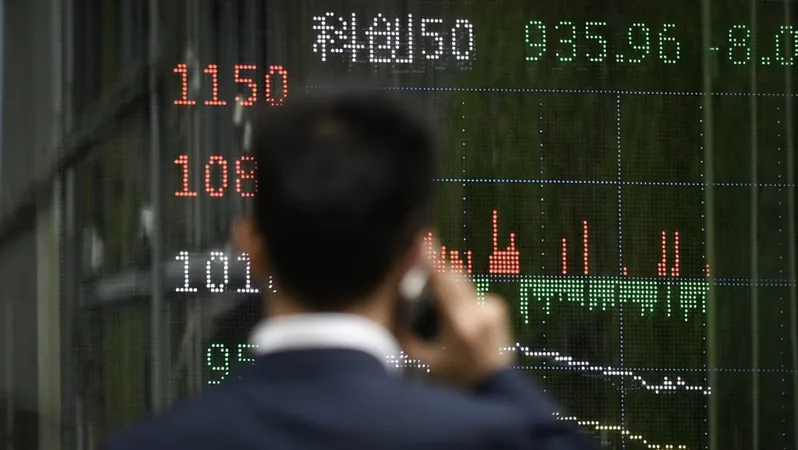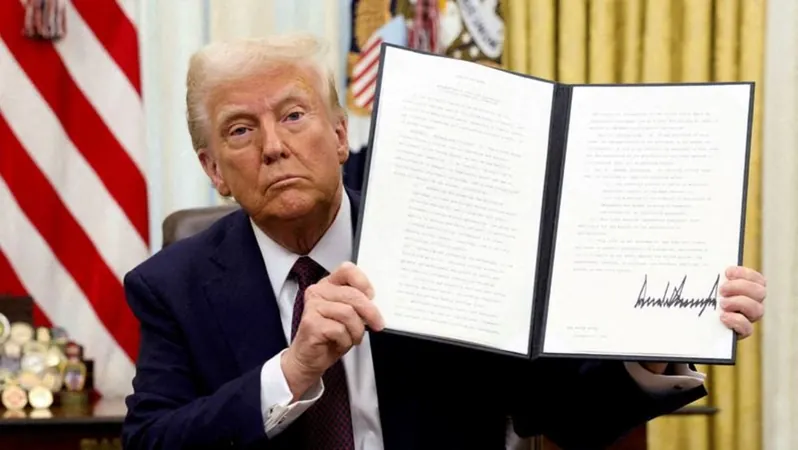
Analysts Sound the Alarm: Market Turmoil to Continue Amid Rising Tariff Tensions
2025-04-07
Author: Daniel
SINGAPORE: The global financial landscape is facing significant turmoil as investors are left to navigate the ramifications of extensive tariffs recently announced by US President Donald Trump.
Analysts are urging caution, highlighting that market volatility is likely to remain a central theme in the coming weeks.
Morningstar market strategist Kai Wang emphasizes, "The uncertainty surrounding tariffs continues to breed instability in the markets. As long as confidence is shaky, expect ongoing fluctuations." The tariffs, referred to as "Liberation Day" by Trump, were unveiled on April 2 and exceeded expectations. A baseline 10% tariff was imposed on all US imports, with even steeper rates for countries deemed to be major violators of fair trade practices, including China and the European Union.
The repercussions were immediate; a sharp sell-off ensued across global markets. US stocks saw a staggering loss of nearly $6 trillion last week—the worst decline since the COVID-19 pandemic began in 2020. Following suit, Asian and European markets plunged into the red, with many benchmark indices showing alarming declines.
PENDING MARKET INSTABILITY
James Ooi, market strategist at Tiger Brokers, predicts that the market instability is far from over. The unpredictable responses from other nations could exacerbate the situation. Countries like China have already retaliated with imposing a 34% tariff on US goods, while others, including Vietnam and India, have indicated a desire for negotiations with the US. However, the timeline for any concrete agreements remains uncertain.
According to analysts at Nomura, stocks remain vulnerable. They argue that it will take weeks or even months for the entirety of the tariff impact on the US economy to manifest clearly in earnings reports and economic data. “Any downturn in economic data could intensify fears of a recession or stagflation, further negatively impacting market sentiment,” they stated in a report.
Moreover, the looming threat of further tariffs on US imports of semiconductors and pharmaceuticals is still under discussion, potentially adding to the market’s woes. As Asian economies, particularly those reliant on exports, face high reciprocal tariffs, analysts advise adopting a cautious approach.
Nomura analysts warn against any impulse to start bargain hunting amidst the recent downturn. “We believe stock prices might decline further before we see any stabilization,” they cautioned. Potential opportunities may surface when the climate of uncertainty begins to dissipate, particularly within Chinese and Hong Kong markets, which may have the resiliency to outperform due to the flexibility of Chinese policymakers in using monetary tools to stimulate domestic consumption.
STRATEGIC INVESTMENT RECOMMENDATIONS
Given the current market conditions, investing in defensive sectors—such as utilities and consumer staples—is highly recommended. These sectors demonstrated resilience during previous tariff announcements in Trump's first term. Wang advises investors to be meticulous in their selection, saying, “Be very selective in your approach to deploying resources.”
Zane Aw of Phillip Securities Research echoes the sentiment, recommending that investors focus on companies with strong balance sheets, low debt levels, and consistent cash flows. Additionally, diversifying portfolios with low-risk assets like gold is becoming increasingly popular, with demand for gold exchange-traded funds seeing a remarkable increase—buy volumes exceeding sell volumes by 123% year-to-date.
Bonds are also gaining traction as a vital component for risk aversion. Hugh Chung, chief investment officer at Endowus, emphasizes the importance of including high-quality bonds in portfolios amid rising recession probabilities.
SINGAPORE MARKET UPDATE: IMPACTS AND OPPORTUNITIES
In Singapore, the key Straits Times Index (STI) dropped by 7.5% to 3,540.5 on Monday, recovering slightly after an initial 8.5% drop at the start of the trading day. DBS analysts have revised their year-end STI target to 3,855, down from 4,080, reflecting the ongoing volatility in the market.
The Singapore banking sector has been significantly impacted, with DBS stocks decreasing by 9.3% to S$39.28, OCBC plummeting by 6.9% to S$15.47, and UOB sliding by 6.3% to S$33.23. Overall, the financial sector is grappling with potential slower growth and reduced net interest margins, according to Maybank analyst Thilan Wickramasinghe.
Despite recent market dips, there has not been a widespread exit from local bank stocks, which are often favored by long-term investors for their stability and reliable dividends. Analysts, including Ms. Tan from CMC Markets, suggest this recent downturn could provide a buying opportunity, presenting attractive valuations amidst market turbulence.
Beyond the financial sector, analysts at DBS have identified consumer staples and utilities as promising investment avenues. Their suggestions include companies like Sheng Siong Group and DFI Retail Group. Notably, real estate investment trusts (REITs) are also becoming a focus, given their contractual rental income, providing stability amid the downturn. Darren Chan, senior research analyst at Phillip Securities, stated that with solid operating fundamentals and potential Fed rate cuts, REITs are well-positioned for performance improvements in the coming months.
As the market grapples with turbulence following Trump's recent tariff announcements, investors are advised to exercise caution, consider defensive strategies, and stay informed on evolving economic indicators.




 Brasil (PT)
Brasil (PT)
 Canada (EN)
Canada (EN)
 Chile (ES)
Chile (ES)
 Česko (CS)
Česko (CS)
 대한민국 (KO)
대한민국 (KO)
 España (ES)
España (ES)
 France (FR)
France (FR)
 Hong Kong (EN)
Hong Kong (EN)
 Italia (IT)
Italia (IT)
 日本 (JA)
日本 (JA)
 Magyarország (HU)
Magyarország (HU)
 Norge (NO)
Norge (NO)
 Polska (PL)
Polska (PL)
 Schweiz (DE)
Schweiz (DE)
 Singapore (EN)
Singapore (EN)
 Sverige (SV)
Sverige (SV)
 Suomi (FI)
Suomi (FI)
 Türkiye (TR)
Türkiye (TR)
 الإمارات العربية المتحدة (AR)
الإمارات العربية المتحدة (AR)